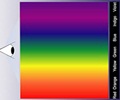Researchers have discovered that the eyes of Arctic reindeer change colour through the seasons from gold to blue. Adapting to extreme changes of light levels in their environment and it helps them detect predators.

Arctic reindeer, like many animals, have a layer of tissue in the eye called the tapetum lucidum (TL) which lies behind the retina and reflects light back through it to enhance night vision.
By changing its colour the TL reflects different wavelengths of light. In the bright light of summer the TL in Arctic reindeer is gold, similar to many other mammals, which reflects most light back directly through the retina.
However by winter it has changed to a deep blue which reflects less light out of the eye.
This change scatters more light through photoreceptors at the back of the eye, increasing the sensitivity of the retina in response to the limited winter light
The team believes this would be an advantage in the prolonged murk of winter, allowing reindeer to more easily detect moving predators and forage.
"This gives them an advantage when it comes to spotting predators, which could save their lives."
Previous work from Professor Jeffery and Norwegian colleagues from Tromso had shown that Arctic reindeer eyes can also see ultraviolet, which is abundant in Arctic light but invisible to humans, and that they use this to find food and see predators.
The blue reflection from the winter eye is likely to favour ultra-violet sensitivity.
Source-Eurekalert
 MEDINDIA
MEDINDIA




 Email
Email







